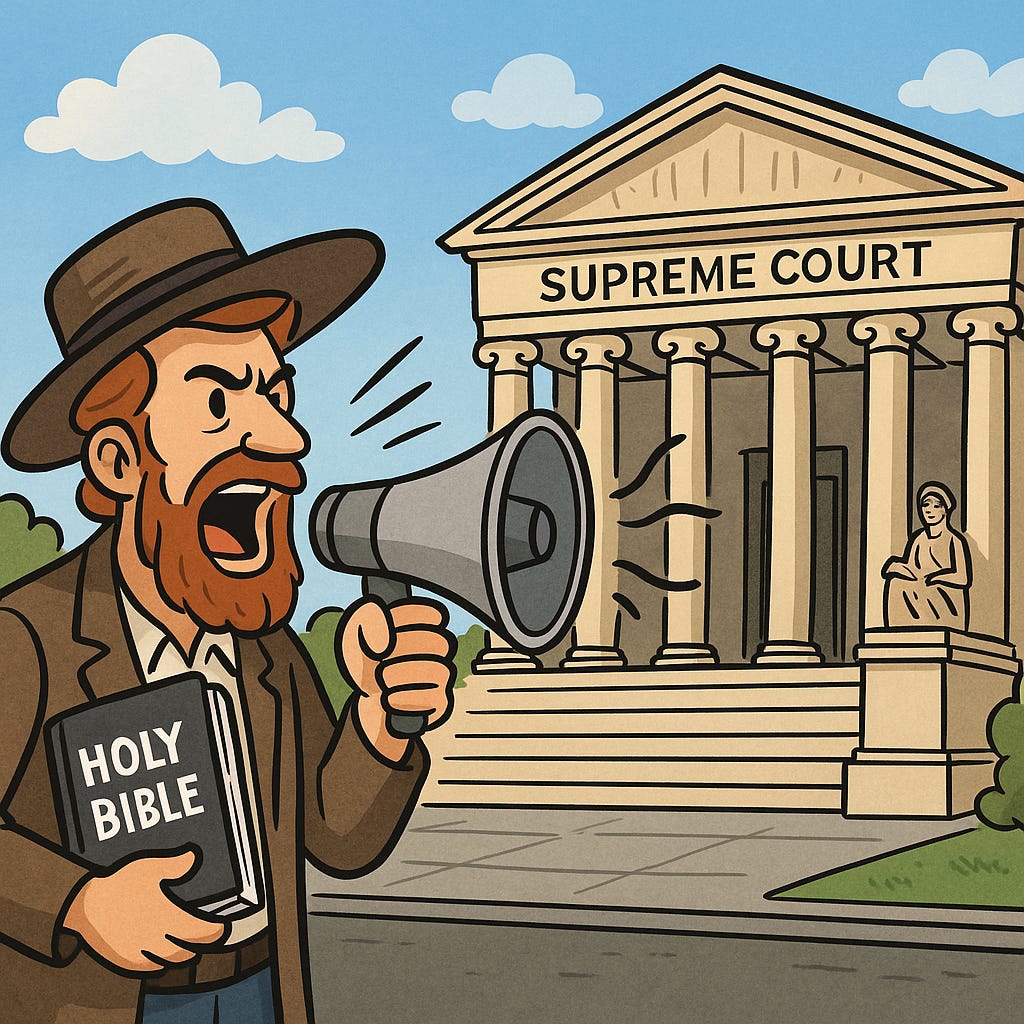I. The Scene in Brandon
In 2018, Brandon, Mississippi—a growing suburb east of Jackson—opened its gleaming new amphitheater, complete with food vendors, traffic cones, and country music stars on tour.
Not long after, Gabriel Olivier, a Christian evangelist, saw the crowds as a mission opportunity. He and several others arrived before concerts to preach, carrying large signs—some showing graphic anti-abortion images—and shouting sermons through a bullhorn.
The police said the noise drowned out their radios. Drivers complained they couldn’t hear directions. Pedestrians veered into the road to avoid the crowd. The city’s patience wore thin.
Brandon passed a “protest ordinance.” It required demonstrations to stay in a designated area about 265 feet from the venue, banned loudspeakers audible beyond 100 feet, and limited signs to handheld size. The city insisted the rules were neutral, applying to all speakers regardless of message.
In May 2021, when country artist Lee Brice performed, Olivier returned to the amphitheater entrance, bullhorn in hand, and refused to move. Police cited him for violating the ordinance. He was convicted in city court, fined, and sentenced to a suspended term with probation.
II. The Lawsuit
After completing probation, Olivier went to federal court. He didn’t want damages—he wanted protection. His lawsuit under 42 U.S.C. § 1983 asked a judge to declare Brandon’s ordinance unconstitutional and stop the city from enforcing it against him again.
The city’s lawyers countered with a wall built decades earlier: Heck v. Humphrey (1994). They argued that Olivier couldn’t attack a law under which he’d already been convicted without first getting that conviction overturned.
Both the federal district court and the U.S. Court of Appeals for the Fifth Circuit agreed. They said that even though Olivier only wanted to stop future enforcement, his case “necessarily implied” that his old conviction was invalid. Under Heck, that made his claim off-limits.
Eight Fifth Circuit judges dissented when the full court declined to reconsider. They called the ruling “indefensible” and “contrary to common sense.” But the majority’s decision held.
III. The Heck Rule Explained
To understand the fight, you have to know what Heck actually said.
In 1994, the Supreme Court ruled in Heck v. Humphrey that a man serving time for murder couldn’t sue police and prosecutors for violating his rights unless his conviction had already been overturned. The Court reasoned that federal civil suits shouldn’t undermine state convictions that are still valid.
That logic—known as the Heck bar—was supposed to stop prisoners from using civil lawsuits as backdoor appeals. But the Court never said what happens when someone is no longer in custody or wants only to prevent future harm.
Lower courts have been split ever since. Some, like the Ninth and Tenth Circuits, say Heck doesn’t apply once the person’s punishment is over. Others, including the Fifth and Seventh Circuits, say it applies to everyone, even those who served short sentences or paid fines.
IV. What the Supreme Court Will Decide
The Justices agreed to hear Olivier v. City of Brandon (No. 24-993) to answer two questions:
-
Can someone who was punished under a law later ask a federal court to stop that law from being enforced again?
-
Does the Heck rule apply to people who never had access to federal habeas corpus—like those on brief probation or who already finished their sentence?
Olivier’s lawyers, from First Liberty Institute and Gibson Dunn & Crutcher, say the Fifth Circuit’s view effectively traps people. If they serve a short sentence, they can’t file for habeas relief—and under Heck, they can’t sue either. “That can’t be the law,” they argue.
The City of Brandon, represented by Phelps Dunbar LLP, insists Heck applies “no matter the relief sought.” Declaring the ordinance unconstitutional, they say, would mean Olivier’s past conviction was invalid—exactly what Heck forbids.
V. Why It Matters
The case has broad implications. Across the country, people convicted of minor offenses—such as protest violations, noise ordinances, or curfew laws—often finish their punishment long before they could challenge the law in court.
Under the Fifth Circuit’s approach, they would never be able to bring a civil rights case, even to stop future enforcement. Under the Ninth and Tenth Circuits’ approach, they could.
The Supreme Court’s ruling will decide which view controls nationwide.
VI. The Road Ahead
The case will be argued on December 3, 2025. Expect sharp questions about finality, fairness, and free speech—and whether a conviction for standing in the wrong place should silence a person forever.
A decision is expected by June 2026. Until then, the bullhorns in Brandon are quiet, waiting for word from Washington
SEO Tags: Heck v. Humphrey, Olivier v. City of Brandon, Supreme Court 2025, Section 1983, First Amendment
Case Materials: https://www.scotusblog.com/cases/case-files/olivier-v-city-of-brandon-mississippi/


